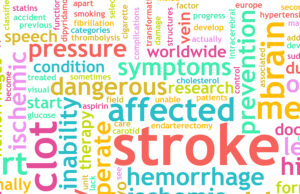Most Common Stroke Signs to Watch For in Your Elderly Loved One
Strokes are more sudden than most other health issues. There are many health issues that come on over years. The patient has warning that something is going to happen or is getting worse. However, many people who have a stroke didn’t even know that anything was wrong – they didn’t get a waring. With this being said, if you are caring for your elderly loved one, it is to learn more about the most common stroke signs. The sooner you can recognize a stroke in your elderly loved one, the more likely they will be to get the necessary treatment to save their life.
Start with “F”

Caregiver Rockford, MI: Signs of a Stroke
The first thing that you will likely notice if your elderly loved one is having a stroke is changes in their face. People who are having a stroke have drooping on one of the sides of their face. It might look like your elderly loved one’s cheek and eye are drooping downward. This will likely be very noticeable when comparing it to the other side of their face. If this is happening, be sure you get your elderly loved one medical attention right away.
Watch for the “A”
Another thing that you should watch, when looking for a stroke, is the arms. If your elderly loved one is having a stroke, their arms will be different. They could have weakness and/or numbness in their arms. They might be unable to lift their arms, as well. If these changes are happening, you or the caregivers that are watching over your elderly loved one should get them emergent medical attention.
Check the “S”
When someone is having a stroke, they will have trouble talking. This is something you should pay attention to with your elderly loved one. You might notice their speech is slurred. They might be unable to talk altogether, as well. The severity of this will depend on the severity of the stroke. Regardless of how mild or severe this is, you should get your elderly loved one immediate medical attention.
Focus on the “T”
You will also need to focus on the time. When a stroke is happening, it is important to act as quickly as you can. If you notice any of these things happening in your elderly loved one, you should get them immediate medical care. The sooner they get care, the more likely that treatment will be able to help them.
Conclusion
These are some of the most common stroke signs to watch for in your elderly loved one. If these things happen when you and/or caregivers are keeping an eye on your elderly loved one, getting them immediate emergency medical care is the best way to save their life.
If you or someone you know needs help with a Caregiver in Rockford, MI, contact Gauthier Family Home Care. We provide quality and affordable home care services in our community. Call us at (616) 258-2300 for more information.
Sources
https://www.cdc.gov/stroke/signs_symptoms.htm#:~:text=Sudden%20numbness%20or%20weakness%20in,balance%2C%20or%20lack%20of%20coordination.
https://www.ninds.nih.gov/Disorders/All-Disorders/Stroke-Information-Page
- Ensuring a Smooth Transition From Hospital to Home - June 4, 2025
- Caregiver of the Month – June 2025 - June 2, 2025
- Common Sense Summer Tips for Seniors to Help Them Beat the Heat - May 28, 2025

